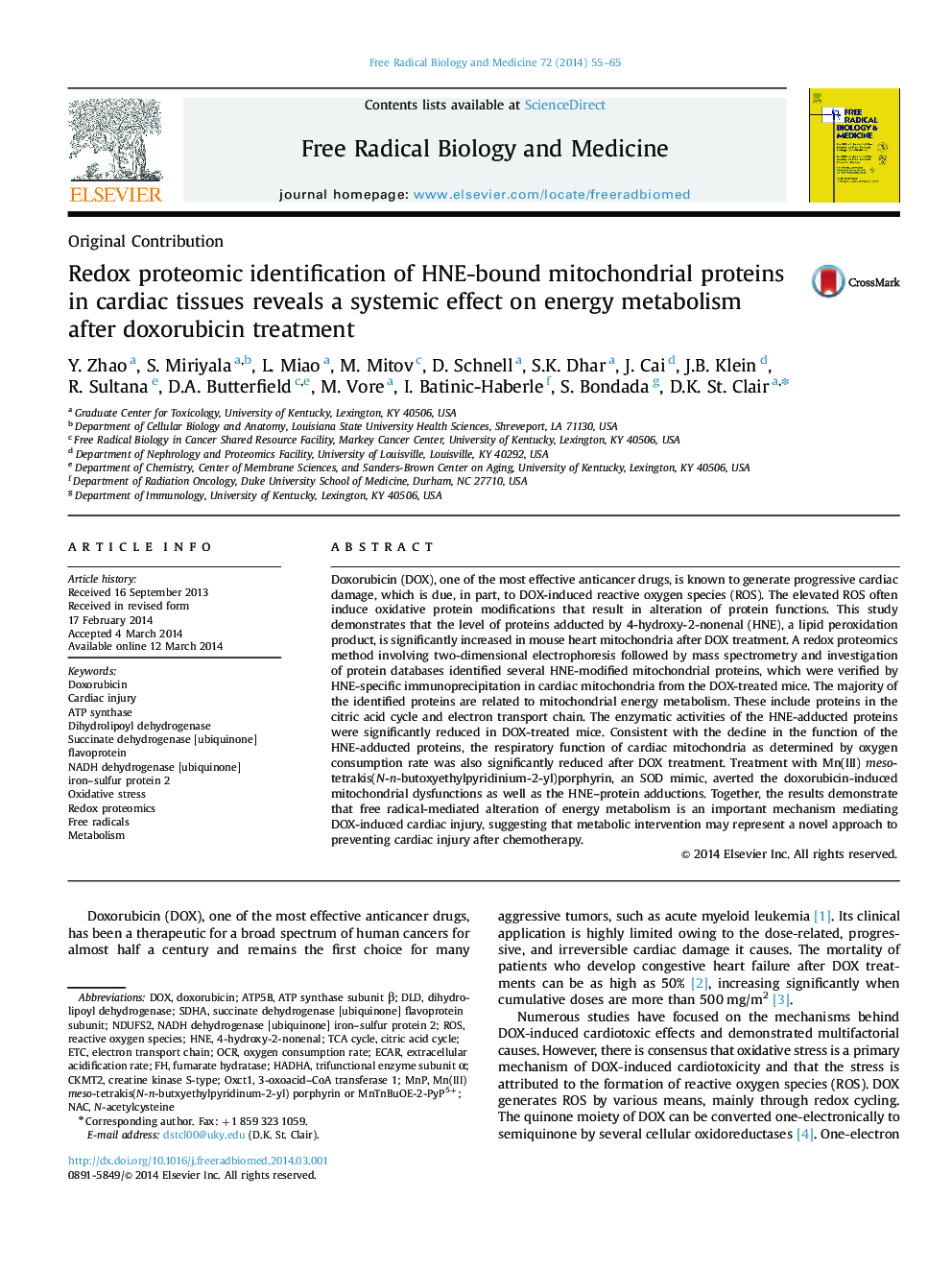| کد مقاله | کد نشریه | سال انتشار | مقاله انگلیسی | نسخه تمام متن |
|---|---|---|---|---|
| 8270147 | 1534970 | 2014 | 11 صفحه PDF | دانلود رایگان |
عنوان انگلیسی مقاله ISI
Redox proteomic identification of HNE-bound mitochondrial proteins in cardiac tissues reveals a systemic effect on energy metabolism after doxorubicin treatment
دانلود مقاله + سفارش ترجمه
دانلود مقاله ISI انگلیسی
رایگان برای ایرانیان
کلمات کلیدی
HNENDUFS2DOXECARMNPATP5BNACDLDOCRsdhA4-hydroxy-2-nonenal - 4-هیدروکسی-2 غیرنالATP synthase - ATP سنتازN-acetylcysteine - N-استیل سیستئینROS - ROSCardiac injury - آسیب قلبیOxidative stress - تنش اکسیداتیوHADHA - حدیثDoxorubicin - دوکسوروبیسینdihydrolipoyl dehydrogenase - دی هیدرولیپویل دهیدروژنازFree radicals - رادیکال آزادelectron transport chain - زنجیره انتقال الکترونfumarate hydratase - فومارات هیدراتازMetabolism - متابولیسم Oxygen consumption rate - میزان مصرف اکسیژنextracellular acidification rate - نرخ اسیدی شدن خارج سلولیETc - و غیرهRedox proteomics - پروتویمیک ردوکسTCA cycle - چرخه TCACitric acid cycle - چرخه اسید سیتریکReactive oxygen species - گونههای فعال اکسیژن
موضوعات مرتبط
علوم زیستی و بیوفناوری
بیوشیمی، ژنتیک و زیست شناسی مولکولی
سالمندی
پیش نمایش صفحه اول مقاله

چکیده انگلیسی
Doxorubicin (DOX), one of the most effective anticancer drugs, is known to generate progressive cardiac damage, which is due, in part, to DOX-induced reactive oxygen species (ROS). The elevated ROS often induce oxidative protein modifications that result in alteration of protein functions. This study demonstrates that the level of proteins adducted by 4-hydroxy-2-nonenal (HNE), a lipid peroxidation product, is significantly increased in mouse heart mitochondria after DOX treatment. A redox proteomics method involving two-dimensional electrophoresis followed by mass spectrometry and investigation of protein databases identified several HNE-modified mitochondrial proteins, which were verified by HNE-specific immunoprecipitation in cardiac mitochondria from the DOX-treated mice. The majority of the identified proteins are related to mitochondrial energy metabolism. These include proteins in the citric acid cycle and electron transport chain. The enzymatic activities of the HNE-adducted proteins were significantly reduced in DOX-treated mice. Consistent with the decline in the function of the HNE-adducted proteins, the respiratory function of cardiac mitochondria as determined by oxygen consumption rate was also significantly reduced after DOX treatment. Treatment with Mn(III) meso-tetrakis(N-n-butoxyethylpyridinium-2-yl)porphyrin, an SOD mimic, averted the doxorubicin-induced mitochondrial dysfunctions as well as the HNE-protein adductions. Together, the results demonstrate that free radical-mediated alteration of energy metabolism is an important mechanism mediating DOX-induced cardiac injury, suggesting that metabolic intervention may represent a novel approach to preventing cardiac injury after chemotherapy.
ناشر
Database: Elsevier - ScienceDirect (ساینس دایرکت)
Journal: Free Radical Biology and Medicine - Volume 72, July 2014, Pages 55-65
Journal: Free Radical Biology and Medicine - Volume 72, July 2014, Pages 55-65
نویسندگان
Y. Zhao, S. Miriyala, L. Miao, M. Mitov, D. Schnell, S.K. Dhar, J. Cai, J.B. Klein, R. Sultana, D.A. Butterfield, M. Vore, I. Batinic-Haberle, S. Bondada, D.K. St. Clair,